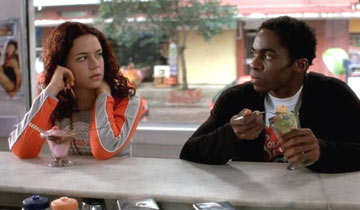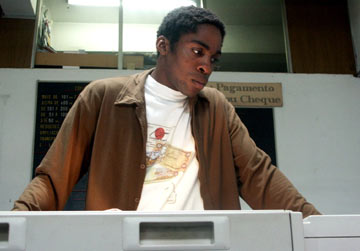

Brazil is a dangerous place, if the movies from there that make it here are any indication. For every Me You Them and Orfeu, there is a City of God, Carandiru, and Madame Sata. Falling somewhere in the middle is The Man Who Copied, a film that won eight Brazilian Academy Awards, including ones for director, screenplay, film, and supporting actor and actress. The characters here are not gang members, in prison, or legendary cross-dressers. Instead, they are normal people, trying to make their way in life. Unfortunately, they are not always making the best choices.
Nearly all of the film is from the point of view of Andre (Lazaro Ramos, Carandiru, Madame Sata), a young man who works as a copy machine operator. He makes copies. It's a boring life, and he spends his time gleaning bits of information off what he copies. In an unusual move, writer/director Jorge Furtado (Two Summers, Angelo Anda Sumido) has Andre narrate nearly half the film. At first, it feels Andre is introducing the audience to his world, but it keeps going. Typically, this is lazy storytelling, but instead, Furtado draws the viewer into Andre's world. The see how bored he is, and how his job sucks the life out of him. Andre wants to be an illustrator, but doesn't have the money. He also spies on Silvia (Leandra Leal, O, Viajante, The Oyster and the Wind), something that normally seem creepy, but Furtado manages to convince people that it is almost cute. Ramos is great. He comes off as extremely ordinary, almost the type of guy that people ignore. It's an even better performance when contrasted with his role in Madame Sata.
Andre learns that Silvia works in a shop that sells women's clothes. He works up the guts to ask her out, only to fail miserably. Undeterred, he works his way into her daily schedule, so they always happen to bump into each other. They become friends, but Andre cannot seem to get past friendship. He thinks that gifts will impress Silvia, and for that he needs money. For money, he turns to Cardoso (Pedro Cardoso, Bossa Nova, Treason). Cardoso is trying to woo Andre's coworker Marines (Luana Piovani, Super Colosso). Marines stated that she will not sleep with a man who is poor and who smokes, and Cardoso figures he would start improve his chances by quitting his cigarette habit. Cardoso also needs money, and this is where Furtado switches the tone of The Man Who Copied.
Up to this point, the film is a genteel courtship between Andre and Silvia. As Andre grows to like Silvia more, he feels responsible for making her life better. Furtado throws in some darkness, taking the film from black and white into shades of gray. Andre and Cardoso both have the best of intentions, but little patience or forethought. They want money, and they want it immediately. Temptation looms large, and one the pair indulges, it seems okay, causing them to go a step further. Furtado was sneaky and did this to the audience. At first, Andre seems like a stalker. He spies on Silvia and follows her around. Yet, after about half an hour, it seems more endearing than anything else. It seems right, but is it? Do the ends justify the means? And speaking of ends, The Man Who Copied is one of those films where it is extremely difficult to predict what is going to happen. The story takes a couple of unexpected turns, and it's a nice feeling to not know where the plot is heading.